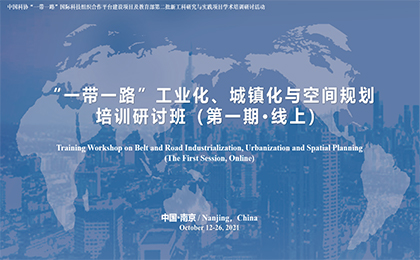

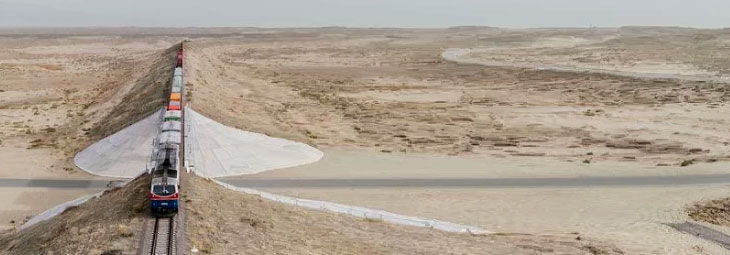
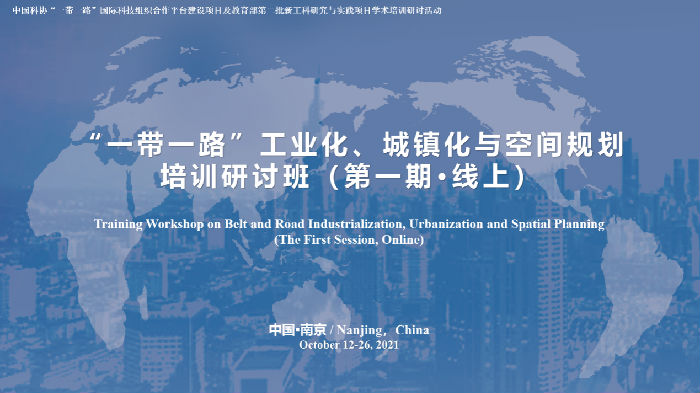
Source: School of Architecture, Southeast University
From October 12 to 26, 2021, the Training Workshop on Belt and Road Industrialization, Urbanization and Spatial Planning (The First Session, Online) was successfully held. This workshop is the academic training of China Association for Science and Technology (CAST) Program of International Collaboration Platform for Science and Technology Organizations in Belt and Road Countries and the Emerging Engineering Education Research and Practice Program of the Ministry of Education. It is sponsored by the School of Architecture at Southeast University, and organized by International Joint Center for Planning and Design Technology of Belt and Road Sustainable Industrial Parks (CAST Program of International Collaboration Platform for Science and Technology Organizations in Belt and Road Countries), International Cooperation Center for the Development and Planning of Sustainable Industrial Parks of Southeast University. Urban Planning Society of China (UPSC) is the recommend and partner institution of China Association for Science and Technology (CAST) Program of International Collaboration Platform and the Emerging Engineering Education Research and Practice Program of the Ministry of Education.
Centering on the theme of "Belt and Road Industrialization, Urbanization and Spatial Planning", this training workshop integrates the high-quality faculty resources of International Joint Center’s domestic and foreign partner institutions. Renowned experts and scholars from the United Nations and other international organizations, well-known universities along the Belt and Road, China's "Double First-class" universities and national planning and design institute were invited to give training lectures. A total of seven high-end special training lectures were included in the workshop. More than 270 participants from 43 countries and regions along the Belt and Road signed up and participated in the workshop, which was conducted online and in both Chinese and English. Participants include scholars and students from countries along the Belt and Road, foreign students in China, staff of government departments, employees of industrial parks at home and abroad, planning and design technicians, and faculties and students from universities in China.
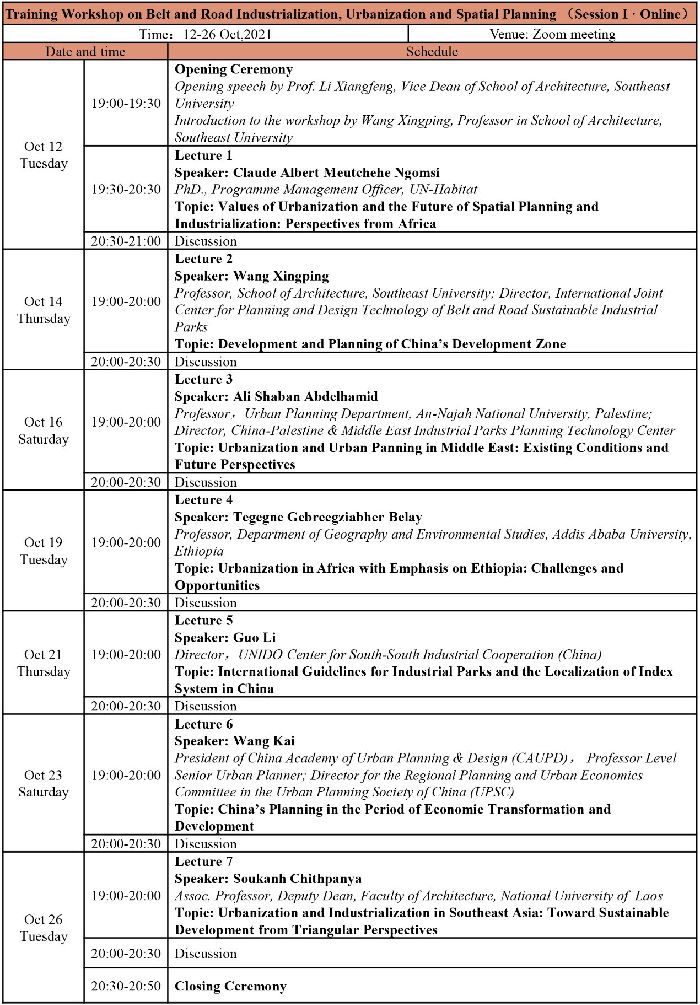
General schedule of the Training Workshop on Belt and Road Industrialization, Urbanization and Spatial Planning (The First Session, Online)
The Training Workshop started at 7 p.m. Beijing time on October 12. The opening ceremony was hosted by Prof.Li Yingcheng from School of Architecture, and Prof.Li Xiangfeng, vice dean of School of Architecture, delivered opening speech. Prof. Li Xiangfeng pointed out that to further implement the Belt and Road Initiative, the School of Architecture at Southeast University prepared and organized this Training Workshop relying on China Association for Science and Technology (CAST) Program of International Collaboration Platform. This is of great significance for strengthening the cooperation between School of Architecture and universities along the Belt and Road, relevant international organizations, government departments and enterprises, promoting and disseminating the theoretical achievements and practical experience of China's urbanization and industrialization, and further strengthening the value identification of the community with a shared future for mankind.Then, Prof. Wang Xingping, Head of Training Workshop, Director of International Joint Center for Planning and Design Technology of Belt and Road Sustainable Industrial Parks, introduced the background, significance and arrangement of the Training Workshop and presented warm welcome to all trainees.

Opening speech by Prof. Li Xiangfeng, vice dean of School of Architecture, Southeast University
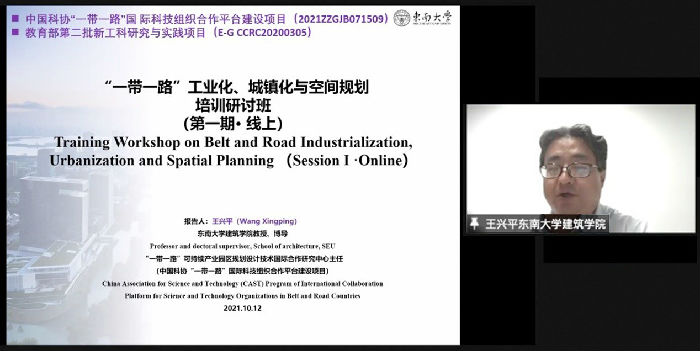
Prof. Wang Xingping, Head of Training Workshop, Director of International Joint Center for Planning and Design Technology of Belt and Road Sustainable Industrial Parks, introduced the arrangement of Training Workshop
After the opening ceremony is the first training lecture, and other training lectures follow.
【Lecture 1】Claude A. M. Ngomsi:Values of Urbanization and the Future of Spatial Planning and Industrialization: Perspectives from Africa
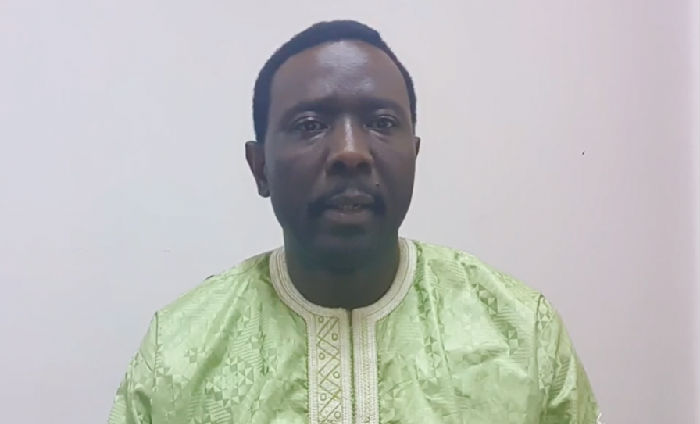
PhD., Programme Management Officer, UN-Habitat
In the lecture, Dr. Claude analyzed the process and driving forces of global urbanization and introduced the challenges and uncertainties facing global urbanization at present. He elaborated on the value of urbanization from six aspects of economy, society, environment, innovation, local government and investment, linked the Belt and Road Initiative to the critical decade of action to achieve the Sustainable Development Goals of the United Nations, and further analyzed the impact and inspiration for Africa's development.
【Lecture 2】Wang Xingping:Development and Planning of China's Development Zone
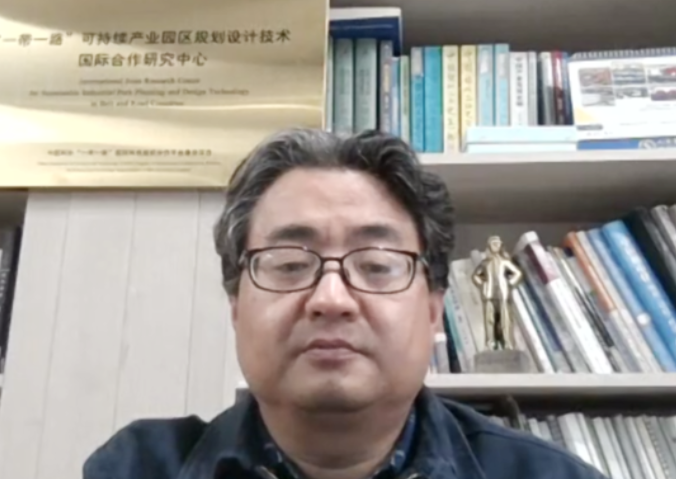
Head of Training Workshop; Director of International Joint Center for Planning and Design Technology of Belt and Road Sustainable Industrial Parks; Professor in School of Architecture, Southeast University
In the lecture, Prof.Wang Xingping systematically sorted out China's development zones from concept, type, distribution and historical stage of development, and analyzed the role of China's development zones from four aspects of promoting economic development, driving spatial expansion, creating income and employment, and carrying "going out". After that, Prof.Wang Xingping introduced the planning system of development zones in China and the development and planning of China's overseas cooperation industrial parks along the Belt and Road.
【Lecture 3】Ali Shaban Abdelhamid:Urbanization and Urban Panning in Middle East: Existing Conditions and Future Perspectives
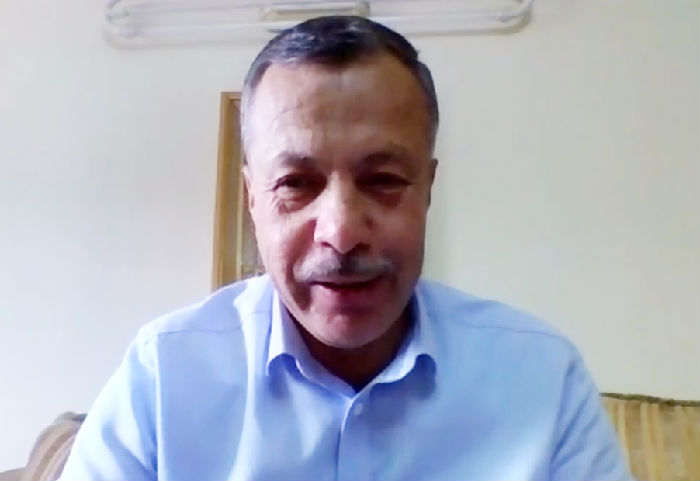
Professor,Urban Planning Department, An-Najah National University, Palestine; Director, China-Palestine & Middle East Industrial Parks Planning Technology Center
In the lecture, Prof. Ali analyzed the trends and challenges of urbanization in the Middle East, and introduced three types of cities shaping the urban pattern in the Middle East, namely international cities, hub cities and mega cities. He interpreted typical urban plans in the Middle East, such as Dubai 2040 Urban Master Plan and Cairo Vision 2050. Prof. Ali spoke highly of the China-Arab States Cooperation Forum and the Belt and Road Initiative, and pointed out that development is the key in China-Middle East cooperation.
【Lecture 4】Tegegne Gebreegziabher Belay:Urbanization in Africa with Emphasis on Ethiopia: Challenges and Opportunities

Professor, Department of Geography and Environmental Studies, Addis Ababa University, Ethiopia
In the lecture, Prof. Tegegne introduced the level and process of urbanization in Africa, and analyzed the transformation process and nature of African cities, as well as the opportunities and challenges brought by African urbanization. Taking Ethiopia as an example, Prof.Tegegne introduced the opportunities and challenges faced by the urbanization in Ethiopia based on systematic data analysis.
【Lecture 5】Guo Li:International Guidelines for Industrial Parks and the Localization of Index System in China
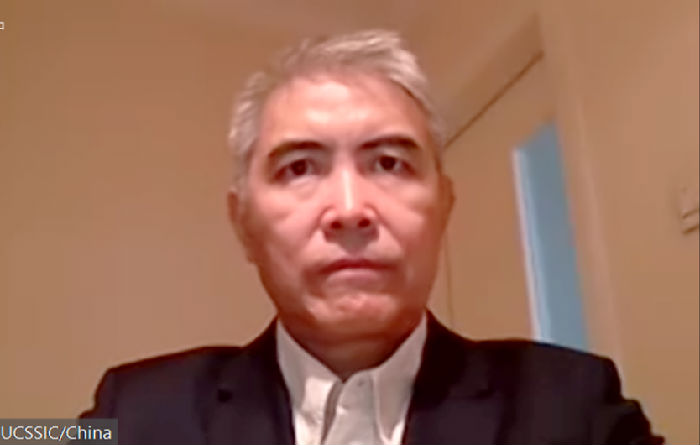
Director,UNIDO Center for South-South Industrial Cooperation (China)
In the lecture, Mr. Guo Li introduced the International Guidelines for Industrial Parks, and systematically introduced the planning and relevant international practices of industrial parks from the aspects of Site Master Planning, Zoning within the Park, Infrastructure Assessment and Planning, Environmental and Social Impact Assessments, etc Finally, Mr. Guo Li shared the relevant work and achievements of the localization research of the International Guidelines for Industrial Parks in China.
【Lecture 6】Wang Kai:China's Planning in the Period of Economic Transformation and Development

President of China Academy of Urban Planning & Design (CAUPD), Professor Level Senior Urban Planner; Director for the Regional Planning and Urban Economics Committee in the Urban Planning Society of China (UPSC)
In the lecture, President Wang Kai introduced the background of urban transformation and development in China and the new trend of planning reform and practice. He believed that the existing mode of economic and urban development need to be changed, and urban renewal, urban design, and the transformation of old residential communities will be priorities of planning. He pointed out that many problems neglected in the previous urban development have been exposed in Covid-19. It will be a new stage of all-round development of economy, society, culture and spatial organization structure when the urbanization rate reaches 60%. Only by taking people as the center and sticking to the road of safe, healthy and livable development can the city have a better future.
【Lecture 7】Soukanh Chithpanya:Urbanization and Industrialization in Southeast Asia: Toward Sustainable Development from Triangular Perspectives
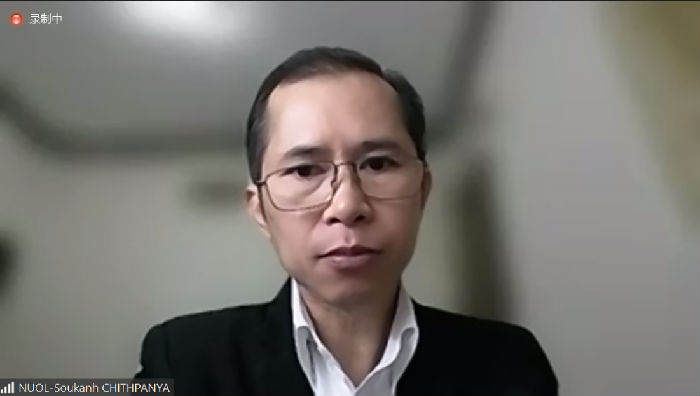
Assoc. Professor, Deputy Dean, Faculty of Architecture, National University of Laos
In the lecture, Prof. Soukanh systematically analyzed the challenges and opportunities facing the sustainable development of industrialization in Southeast Asia, proposed three development paths of Decoupling, Digitization and Decarburization in view of the changing global environment. He proposed three strategies to promote urban transformation and development: cross-border urban agglomeration development, economic structure transformation and interdisciplinary planning method.
Each lecture of this training workshop is hosted by Prof. Wang Xingping, Prof. Li Yingcheng and Assoc. Prof. Hu Pan from the School of Architecture at Southeast University. Online participants actively ask questions, speak and leave messages during the discussion. While highly recognizing and evaluating this training, participants expressed their own views based on their country and region, personal education background, local cultural perspective and research and practice experience. Based on the lectures, participants had fruitful dialogues and exchanges with the lecturers on many topics including industrialization, urbanization, industrial park development and planning along the Belt and Road, urban and rural development and planning, Covid-19, environment and climate change, etc..
On October 26, the 7th training lecture was successfully completed and a short closing ceremony was held. Prof. Wang Xingping, Head of Training Workshop, Director of International Joint Center for Planning and Design Technology of Belt and Road Sustainable Industrial Parks, introduced the follow-up arrangement and made a brief summary. Prof.Wang expressed his sincere thanks to all the experts for their meticulous preparation and the active participation of all the trainees. He hoped to promote exchanges and cooperation in the fields of industrialization, urbanization and spatial planning between China and foreign countries through the series of academic training and seminar activities, build an academic community and international cooperation network, and provide support for the mutual learning of relevant knowledge, interconnection of relevant information and the interaction and trust of talents between China and countries along the Belt and Road. He also hopes to contribute wisdom and strength to the countries along the Belt and Road to achieve more inclusive and sustainable industrialization and urbanization, and to establish more scientific and adaptable city and park planning.
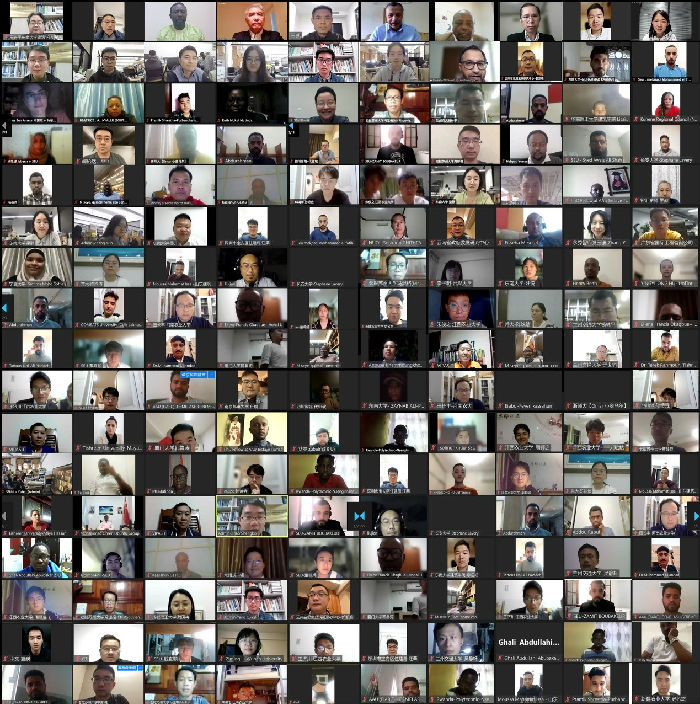
Part of training workshop participants online photo
Source:<https://mp.weixin.qq.com/s/jj6SEz5N76LlNINYwIU4pQ>
Translated by Zhao Shengbo